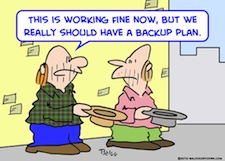 The more complex a system or situation, the more true this phrase is.
The more complex a system or situation, the more true this phrase is.
I am a firm believer in having backups within backups for all mission-critical issues and systems. I like storing key information in multiple places. I like having alternate ways to accomplish critical objectives. I believe in redundancy for all important systems.
It is critical for all backup systems to be truly independent. I remember reading of a poorly-designed power plant where the wires controlling the backup safety system were bundled with the wires for the primary safety system, run through the same conduits, and wired to the same backup electric power. Anything that would knock out the primary system could easily knock out the backups as well. If my memory serves, a water leak caused corrosion that knocked out all control systems.
Planning for failure does not mean you are a pessimist. It means you are a realistic optimist. And it does not mean creating backups for everything; no one has that much time. Identify the most likely sources of failure, the most critical vulnerabilities, as well as the ones that are easiest to guard against. Address these and forge onward.
I know businesspeople who seem to chase ROI (return on investment) with no regard for the relative risk of the returns they are pursuing. The goal is the highest risk-adjusted return, not just the highest return. The point is to address the downside as well as the upside. Better a medium upside with a minimal downside than a high upside with an equally low downside!
I like chess because it requires a lot of time thinking ahead, plotting alternate moves and courses of action (strategic plans) depending on the moves the other side makes. You can attempt to predict what will happen in a chess game, but you control only your own moves. Your moves influence but do not control.
Likewise, you cannot control what happens in life. You can only control how you respond to it. The time you spend thinking how to respond and planning alternate courses of action is invaluable in helping you respond quickly and effectively.
Be a realistic optimist. “Expect success, plan for failure.” Have the resources to respond quickly and effectively when life does not follow your plans.
This is a classic from the NSC Blog archive, originally posted August 14, 2008.


0 Comments